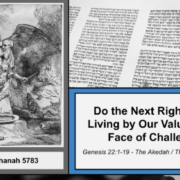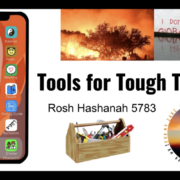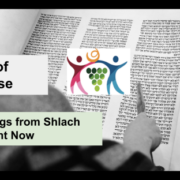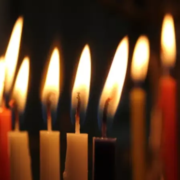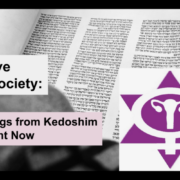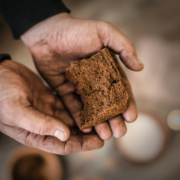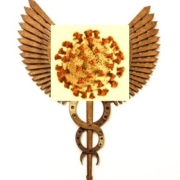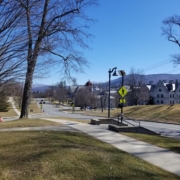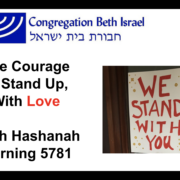This guest post is the D’var Torah that CBI member Ziva Larson offered at Rosh Hashanah 2 Morning Services on Tuesday, September 27, 2022.
This guest post is the D’var Torah that CBI member Ziva Larson offered at Kabbalat Shabbat services on Friday, June 17, 2022.
My son likes to say “We live in a society.” It’s our refrain. We need to be mindful of other people’s needs, because we live in a society. If a kid is being bullied, it’s good to stand up for them, because we live in a society. If a neighbor needs help carrying in the groceries, we offer to help, because we live in a society. We have obligations to each other, because we live in a society..
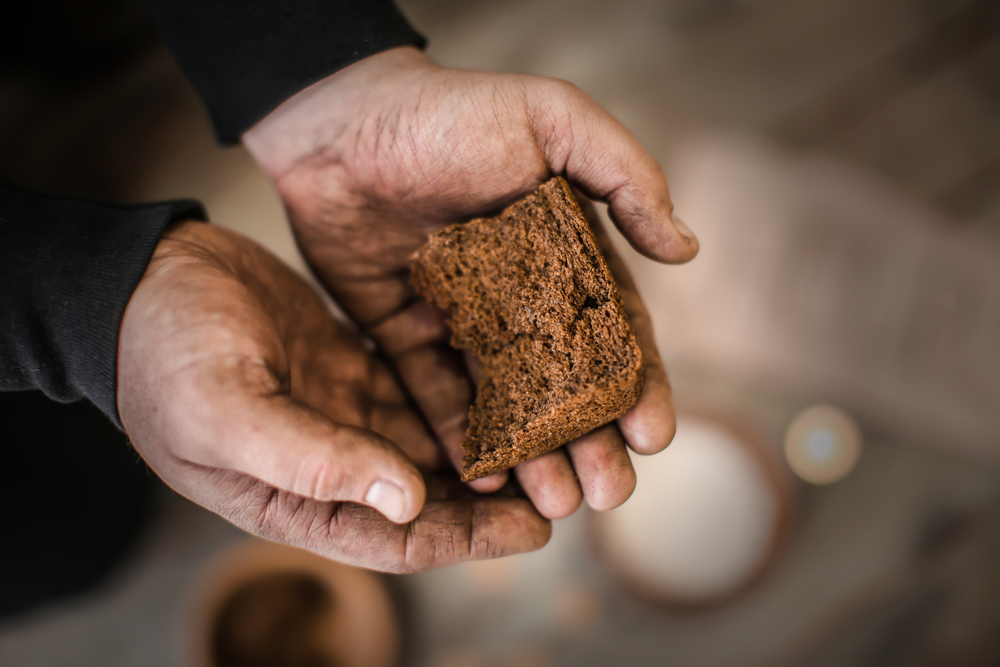
Dear Congregation Beth Israel members and friends,
During the Days of Awe, many synagogues hold food drives for dried and canned foods. We have done this for many years at CBI, in order that the Yom Kippur fast from food and drink be meaningful.
As it turns out, food pantries typically prefer monetary donations to canned food donations. Money doesn’t need to be sorted (as our bags of dried and canned foods do); money does not expire; money enables them to choose what they want and need to feed patrons, rather than relying on what are all-too-often unwanted old cans; and the food pantry can stretch our dollars to purchase more in bulk than what they would be able to provide via our donated cans and boxes alone.
Although not all of us fast from food and drink on Yom Kippur, we can choose to donate to local food pantries during this sacred season. Feeding the hungry is a mitzvah, and so is caring for our local community.
This year, please donate as you are able to help all who are hungry come and eat. You might donate to the Berkshire Food Project, the Friendship Food Pantry, or the Williamstown Food Pantry… or support Mazon: a Jewish response to hunger.
Jewish tradition holds that even one who receives tzedakah is obligated also to give it. What matters isn’t how much we can give, but that we give. Many of us have the luxury of knowing that our stomachs will grumble with hunger on our holy day of fasting but not on the days before and after. Let’s do what we can to ensure that no one in our community goes hungry.
G’mar chatimah tovah — may we be inscribed and sealed for goodness.
Blessings to all,
Rabbi Rachel
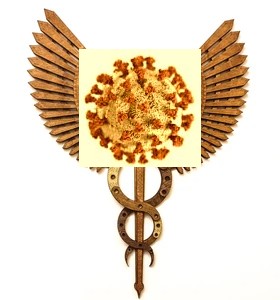
In this week’s Torah portion, Chukat, the children of Israel grouse to Moses, “Why did you take us out of Egypt to die here in the desert?” And God gets angry and sends a plague of snakes, and the snakes bite the people, and people start dying.
The people return to Moses and say, “We sinned by speaking out against God; help!” Moses relays this, and God instructs him to make a copper snake and mount it on a pole. When the people see the copper snake, those who were bitten by the snakes are healed.
Rashi notes that the word snake, nachash, is related to copper, nachoshet. The Hebrew wordplay hints at the miracle here: when someone sees the figure of the snake cast in copper, they are healed from the venom. The reminder of what bit them helps them heal from the bite.
This year, as I read this story, all I can think of is a copper coronavirus. Clearly what we need is a copper sphere covered with a corona of spiky proteins, to hang on a flagpole for the whole nation to see! Okay, gazing at a copper coronavirus wouldn’t actually heal anyone.
But that’s kind of a metaphor for what vaccination does, isn’t it? Our immune systems learn to recognize the shape of the virus. The vaccines teach our bodies to recognize that spiky little mace. And then when they encounter it, they can fight it off. Like our ancient spiritual ancestors looking at those copper snakes.
On my refrigerator, I have the front page from a December 2020 Berkshire Eagle. It shows my kid lighting the North Adams city menorah. And alongside that image, above the next column of print, there’s a headline: “Vaccine Endorsed By Panel.” Subheader: “Country now one step away from starting immunization.”
Six months ago the first vaccine was approved for future use. Remember what a big deal that was?
This week I read about a fourth vaccine now becoming available. Local numbers are the lowest they’ve been in a year. In some places, masks are optional for those who are vaccinated. About 44% of the nation is fully vaccinated, as is more than half of MA. And President Biden recently announced plans to give 500 million doses of Pfizer to other nations in need.
The pandemic isn’t over. But we’ve come an incredibly long way since Chanukah. Modern medicine is miraculous. And because of the tireless work of immunologists and virologists and doctors and nurses and so many others, we’re starting to be able to gather safely again without risking each other or ourselves.
Because vaccines teach our bodies to recognize and respond to the virus, we’re safer than we were. And that too feels to me like a deeper teaching this year. What are the things we need to recognize as a community and as a society, so that together we can respond? What are the injustices and inequities we need to be willing to see, in order to repair them?
Tomorrow is Juneteenth — the date in 1865 when enslaved African-Americans in Texas learned that the Emancipation Proclamation had freed them two and a half years prior. One step toward healing racial inequity is for those of us who are white to recognize the harms experienced by Black people and people of color, both then and now.
The copper snake in this week’s parsha reminds us: we need to see the sickness in order to begin repair. If we don’t recognize it, we can’t fight off a literal virus. If we don’t recognize it, we can’t fight off the spiritual sickness of racism and prejudice, either. We have to see the problem in order to begin to build something new.
And COVID-19 has had a deadlier impact on communities of color than on mostly-white communities. Even as we celebrate the high rates of vaccination where we live, there’s still work to do before we’re all safe.
So pause with me in this Shabbat moment. Take a deep breath. Recognize how lucky we are to be vaccinated, to be in a place that’s getting safer. Join me in trying to open our eyes to everything we need to see within us and around us. May we be gentle with ourselves and each other as we work toward healing: for ourselves, for our communities, for everyone.
This is the d’varling that Rabbi Rachel offered at Kabbalat Shabbat services at CBI (cross-posted to Velveteen Rabbi.)
Dear CBI community,
The last year has been challenging in many ways. The global pandemic, of course, has impacted all of us in ways too numerous to list. We have had difficult conversations across our nation about the racism in America’s history, rooted in the inhumane practice of human chattel slavery long ago. And, relatedly, communal conversations about racism and policing in our nation.
Against that backdrop, there have been conversations about policing closer to home. First there was the news of a poster of Hitler in the Williamstown Police Department. Then came news about racial epithets used by members of the WPD. And most recently, we heard the news that members of the WPD illegally searched the records of people who had been critical of the local police.
Each of these evokes emotional and spiritual responses in us, and some of those responses are rooted in the trauma experienced by previous generations of Jews in other places and times. (Yes, epigenetic / inherited trauma is real — here’s a BBC article about that.)
As this latest news lands, many of us are feeling betrayed by the people we thought we could rely on to protect us and keep us safe. Please know that I am here to listen if you need to talk. Whatever you are feeling, I honor it, and you. Drop in to my Zoom office hours, or make an appointment to meet at another time: I want to be here for you in whatever ways you need.
At the start of the new Board term, the CBI Board unanimously voted to affirm the Not In Our County pledge. That pledge states that we commit to working together with our neighbors for a safer and more integrated community, and we promise that we will not be silent in the face of intolerance or hate in any form.
In light of everything that’s unfolding around us, the CBI Board and I reaffirm our commitment to that pledge, and to ensuring that all of us are (and feel) safe here in Northern Berkshire county — including people of color, and Jewish people, and all who are working toward justice.
Blessings to all,
Rabbi Rachel
[youtube https://www.youtube.com/watch?v=zNMuJWw6syY]
Here’s a video of my sermon if you’d rather watch it than listen to it. (It’s here on YouTube.) Or, you can read on, below…
Do you remember how you felt when you heard the news about the Pittsburgh synagogue shooting?
I remember feeling shock and horror and disbelief. I remember feeling grief. I remember our synagogue sanctuary filled with members of the Northern Berkshire community who came together for a vigil in grief and remembrance.
And I remember coming to shul the very next Shabbat — with a prickle of anxiety running through my veins — and stopping short when I saw the “graffiti love-in” all around our front door.
I knew it was coming. Someone I did not know had reached out to me earlier that week, saying that a group of non-Jewish allies wanted to organize a show of support for us. They didn’t want to surprise us in a way that would compound our feelings of un-safety, so they asked first.
But even though I knew they were doing something, I couldn’t picture what it would be. I didn’t know how it would feel to drive up to our shul one week after the Pittsburgh synagogue massacre and be greeted with chalk art and signs and cards and banners proclaiming that the North Adams community values us and wants us to be safe and wants us to be here.
Their gift made me weep tears of joy — because we are seen, and cherished, and uplifted. And not just by other Jews but by non-Jewish people, by people who are not part of our community or part of our covenant. But they saw that we were afraid, and they stood up for us and said, “you matter; we want you here; we’ve got your back.”
There’s a reason that the most oft-repeated commandment in Torah instructs us to love the stranger for we were strangers in the land of Egypt. Thirty-six times Torah tells us to love the stranger, the immigrant, the refugee, the vulnerable population, because we know how it feels to be in those shoes. The instruction is in the plural: v’ahavtem et ha-ger, y’all shall love the stranger. This isn’t an individual commandment: it’s a communal mitzvah. Together, we love the stranger because we know how it feels.
We know how it feels.
And that’s why I have two signs on my condo front door. One is a blue mogen David that says “Chai Y’all!” I want it to be clear to anyone who drives by that I am Jewish, I am here, I am visible, and I am welcoming! (And I say y’all.) The other is a sign that says Black Lives Matter.
I know that some Jews are uncomfortable with the Black Lives Matter movement because of real or perceived connections between BLM and pro-Palestinian sentiment. I empathize with that discomfort. And there are many intellectual conversations we can have about BLM and Israel / Palestine. But I believe that Jewish values call us to stand up for Black lives even if we feel some discomfort. We need to “de-center” ourselves, because right now this isn’t about us — it’s about standing up for the victims of prejudice and violence. And that’s work we do with our hearts and our souls, not just our intellect.
The Black Lives Matter movement is a grassroots coalition of many organizations, focused on saving the lives of Black people and people of color by changing how we do public safety and policing.
The vast majority of people protesting or holding vigils or putting signs on their lawns are not thinking about international issues (including the Middle East). They’re thinking about George Floyd who died gasping “I can’t breathe” to the officer kneeling on his neck. They’re thinking about Eric Garner who died gasping the same thing to the officer holding him in a chokehold. They’re thinking of Tamir Rice, killed at twelve because an officer mistook his toy for a gun. They’re thinking about Breonna Taylor and Ahmaud Arbery and Atiana Jefferson and Stephon Clark and Botham Jean and Philando Castile.
And maybe they’re thinking about the Greensboro Four, brutally beaten for daring to sit at a Woolworth’s lunch counter. Or Emmett Till, lynched because someone thought he smiled at a white woman. Or the countless Black souls ripped from home and brought to this nation in chains. Or the reality that Black people are dying of covid-19 at rates far higher than white people. Or 400 years of communal experience and communal trauma showing them just how little Black lives have mattered on these shores.
Just as we need non-Jewish allies to stand up for us when there are attacks on Jews, Black people in this country need allies to stand up for them when they are under attack.
And it’s not an either/or. There are many Black Jews who feel keenly both of these forms of oppression, both antisemitism and racism. Not in our little rural community, but in the broader Jewish community. We owe it to them to stand up for them…. and we need to stand up for non-Jewish Black lives, too.
Rabbi Margaret Frisch Klein, who serves as a police chaplain, expresses the needs of this moment with a policing metaphor from Sergeant Dan Rouse: “If we get a call about a domestic violence incident [at a particular address], we don’t stop at every other house along the way. If you go to a fundraiser for breast cancer, you don’t stop at every other fundraiser along the way and say all cancers matter. Right now, Black lives are hurting.” That’s the call we need to answer.
Remember how it felt to see those signs of support on our synagogue doors? I hope that’s how it feels for Black people to see a Black Lives Matter sign. It signifies that someone who sees their trauma and their fear is willing to stand up in the name of their safety. It means that someone who maybe doesn’t look like them nevertheless wants for them basic human rights and human dignity.
I mentioned earlier the discomfort that I know some of us feel around the connection between Black Lives Matter and support for the Palestinian cause. I honor the discomfort, and I understand it. And… I think our discomfort is part of our spiritual work in this time of American reckoning with institutionalized racism. I think part of our work as white-skinned Jews is saying: what you’re enduring is untenable and we stand with you against it, and any disagreements we might have about politics can wait.
We need to stand up for each other even when we feel discomfort. Safety and basic human dignity are the birthright of every human being, no matter what — or at least, they should be, and if they’re not, then we have work to do. And standing up for one another’s safety and dignity is a moral imperative more important than any political disagreement.
In her book Braving the Wilderness, social scientist Brene Brown notes that the English word courage is related to the French coeur: heart. Having courage means having heart. Having courage means listening to the heart and acting from the heart.
It takes courage to stand up for our fellow human beings when they are under threat. It takes courage to stand up and say: I will fight for your human rights and your dignity and your right to live safely. Even if your skin looks different from mine. Even if your politics are different from mine.
Standing up for Black lives is an act of hope that we can build a better America, an America where everyone truly enjoys the rights that our Declaration of Independence enumerates, among them life, liberty, and the pursuit of happiness. Of course, when that Declaration was written, the only people who merited those rights were white men! Thank God our laws no longer enshrine those injustices. But those injustices persist, and our work is not complete.
Standing up for Black lives asks us to confront our own stuff that might get in the way. It asks us to do our own inner work, and to learn how to be actively antiracist — to resist and change the subtle and pervasive racism that’s baked in to our nation’s history and its present. That kind of inner work is exactly what this season of teshuvah, repentance and return, is for.
Remember the kindness our non-Jewish North Adams neighbors extended to us after Pittsburgh? Standing up for Black lives is how we can “pay it forward.”
Torah asks us to love the stranger, because we were strangers in the land of Egypt and we know how it feels. We know how it feels! And we know how it feels when our neighbors stand up for us. May our knowledge move us to stand up for Black lives with hope and courage and heart.
For further reading: from the Jewish Council on Public Affairs, Black Lives Matter, American Jews, and Anti-Semitism: Distinguishing Between the Organization(s), the Movement, and the Ubiquitous Phrase [pdf] 2020.
This is Rabbi Rachel’s sermon from Rosh Hashanah morning (cross-posted to Velveteen Rabbi)

